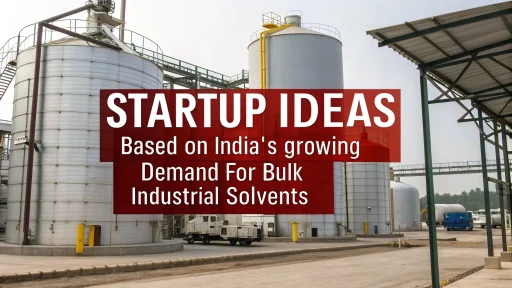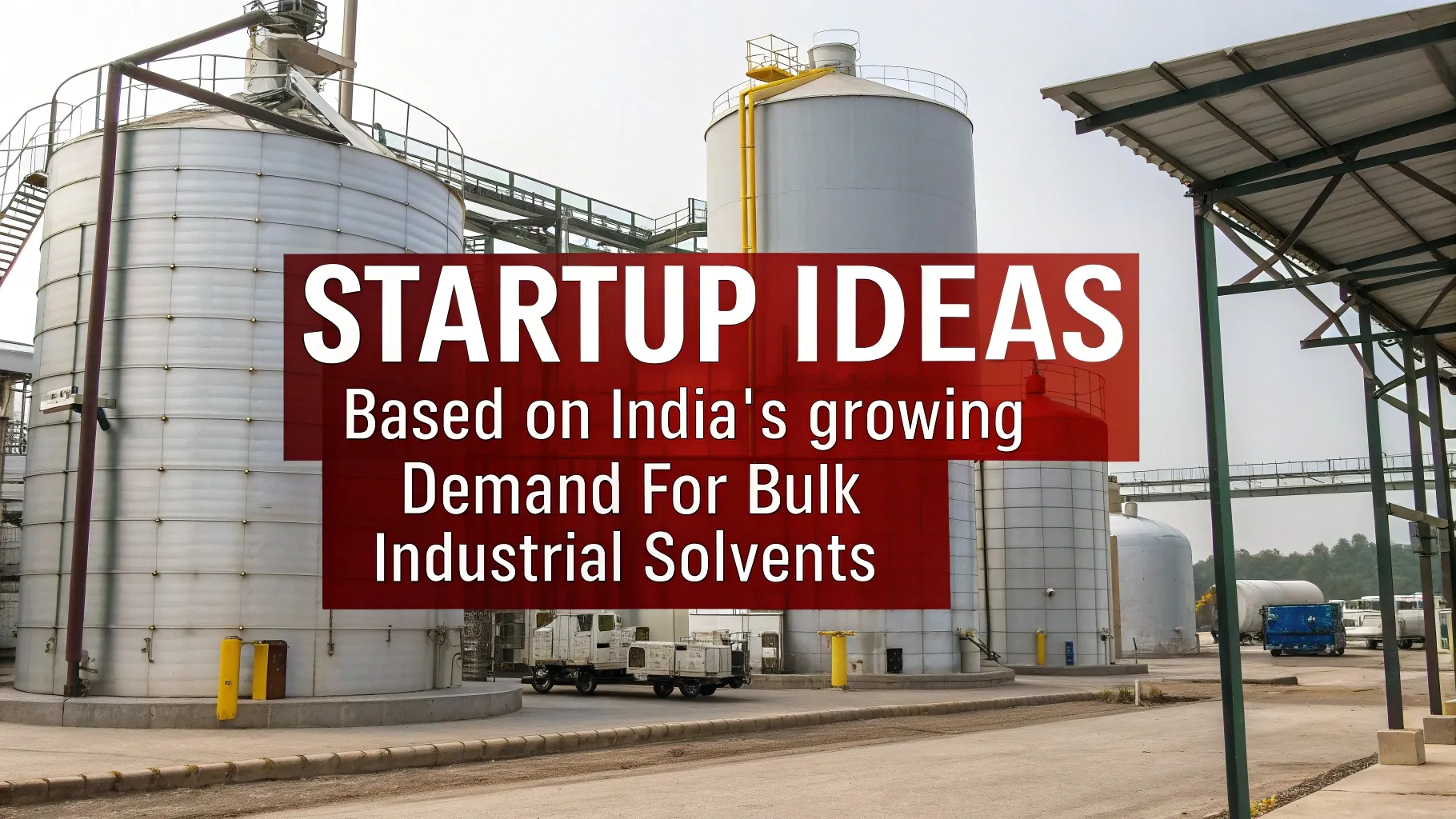Why There is a Great Opportunity with Bulk Industrial Solvents
The industrial landscape in India is rapidly evolving. The rising pharma, agrochemical, textile, paint, adhesive, polymer, and specialty chemical industries have made bulk industrial solvent critical inputs. Ethanol, acetone, toluene, MEK and xylene are just some examples of industrial solvents which are essential to many manufacturing and processing operations.
With the globalization of supply chains and increased production as a result of the Make in India and PLI-linked manufacturing incentives, the bulk solvents industry has grown steadily and strategically. There is an abundant opportunity for entrepreneurs and new businesses to enter this manufacturing and recycling niche or to integrate specialized supply chains.
In this article, I discuss potential startup ideas in India’s bulk industrial solvent industry, analyze the market outlook, outline the basic processes of solvent manufacturing, and suggest key areas for innovative industrial solutions that could make significant profits. If you are a forward-looking entrepreneur thinking about a B2B industrial project, this guide would provide you not just with ideas, but a roadmap.
Understanding Bulk Industrial Solvents: Types and Applications
Bulk solvents are specific chemical compounds that dissolve, dilute, or suspend other materials without altering their properties through the process. They are sorted out based on volatility, polarity, or how they are applied in practice.
Commonly used industrial solvents in India include:
- Alcohols – Ethanol, isopropyl alcohol (IPA), n-butanol
- Ketones – Acetone, methyl ethyl ketone (MEK)
- Aromatic hydrocarbons – Toluene, xylene, benzene
- Chlorinated solvents – Methylene chloride, trichloroethylene
- Esters and glycol ethers – Ethyl acetate, butyl glycol
Applications:
- Pharmaceuticals – API synthesis, cleaning, and crystallization
- Agrochemicals – Formulation of pesticides and herbicides
- Paints & Coatings – Thinning, drying, and mixing
- Adhesives & Sealants – Polymer blending and viscosity control
- Textile & Leather Processing – Degreasing and dyeing
- Oil & Gas – Extraction and cleaning of equipment
The diversity of use cases is immense, showcasing the fantastic potential for niche, scalable manufacturing in the solvent sector.
Related: Investment Opportunities in Solvent Recycling and Repacking Businesses
India’s Bulk Solvent Market: Demand Trends and Sector Outlook
The industrial solvent market in India has experienced strong growth over the last decade, boosted by the increase in domestic manufacturing as well as the move towards localized supply chains.
As per industry insights, India’s solvent market is predicted to grow at a compound annual growth rate (CAGR) of 6.5% from 2024 to 2029, with niche solvents for pharma and electronics having even higher growth.
Key Growth Drivers:
- Increase in API manufacturing in India following global supply chain restructuring
- Increased usage of solvents in greener agrochemical formulations
- Transition from solid to liquid and gel formats for consumer and industrial products
- Increased usage of paints, graphics inks, and coatings in real estate and automotive
- Investment in clusters for fine and specialty chemical manufacturing
Projected Demand Outlook:
| Year | Estimated Market Size (INR Crore) | Dominant Application Segments |
| 2024 | ₹29,000 | Paints, adhesives, basic pharma intermediates |
| 2025 | ₹31,800 | Agrochemicals, construction chemicals |
| 2026 | ₹34,900 | APIs, specialty polymers, packaging inks |
| 2027 | ₹38,400 | EV chemicals, electronics, and semiconductors |
| 2028 | ₹42,600 | Green solvents, recycled solvent blends |
| 2029 | ₹47,200 | Pharma-grade solvents, export-led formulations |
The market outlook indicates a clear shift towards manufacturing value-added, application-specific, and high-purity solvents, opening opportunities for startups in the industry to explore chemical formulation.
The Industrial Solvent Bulk Ecosystem for Startups
There are an array of startup opportunities in this space as the chemical usage becomes more specialized.
1. Solvent Recovery and Recycling Units
There is a considerable amount of pressure on solvent intensive industries to manage their waste solvents and reuse them effectively due to sustainability legislations. This is where startups which provide on-site or centralized recovery systems for solvents will be able to carve out a good niche.
Utilization of used materials is recovering acquirable solvents through distillation, adsorption, and filtration technologies. Recovery plants will be able to sell the recovered solvents back to the manufacturers at a discounted rate or use them internally.
2. Selling Electronics and Pharma High Purity Solvents
The pharmaceutical industry, especially those that deal with manufacturing active pharmaceutical ingredients (APIs), require solvents of a very high standards of purity, such as HPLC-grade acetonitrile, IPA, and methanol. Also, manufacturers of semiconductors and batteries require electronic-grade solvents.
This high-margin segment can be tapped by startups that focus on multi-stage purification processes, dry room environments, and no-contamination filling lines.
3. Solvent Blending and Custom Formulations
Specific evaporation rates, solvency power, or material compatibility are often required by different industries. A startup can build a solvent blending business that caters to customers in:
- Printing and packaging
- Flexible adhesives
- Leather finishing
- Specialty coatings
These blends are usually kept as trade secrets, giving strong customer retention and pricing based on value rather than cost.
4. Bio Based and Green Solvent Production
Eco-friendly and biodegradable chemicals in India are bio-based solvents such as ethyl lactate and D-limonene, and methyl soyate.
Startups can focus on the cosmetic, natural paint, and household cleaner markets by using agro-waste or fermentation for these solvents.
5. Contract Solvent Manufacturing for MNCs
Many multinational companies are interested in locally sourcing solvents to avoid import duties or reduce carbon footprints. Establishing contract manufacturing plants with GMP or REACH compliance opens up opportunities in toll or export-led manufacturing.
Related: Top Opportunities in Halogenated Solvents: How MSMEs Can Enter This High-Demand Market
Manufacturing Process Overview: The Production of Industrial Solvents
The process of making industrial solvents such as IPA, acetone, or MEK follows a certain procedure. Claiming any order of steps would lead to accuracy would be misleading. Each type follows a unique set of steps.
1. Selection of Raw Material and Feed Preparation
Some of these raw materials include propylene, ethylene, n-butane, acetylene, or even fermentation by-products such as glucose or molasses.
Certain removal methods such as purification, vaporizing, or even drying aid in preparing feedstock.
2. Synthesis or Reaction Processes
Depending on the type of solvent being made, different processes can be useful for its production. Oxidation, hydration, fermentation along with many other processes can serve this purpose.
- For the IPA: Propylene is reacted with water in the presence of a phosphoric acid catalyst.
- For bio-solvents: Fermentation is carried out making use of microbes.
- Acetone serves as a common by-product through the phenol production via the cumene process.
3. Distillation and Separation
Following post-reaction, the next step is to separate solvents from their byproducts through fractional distillation, azeotropic distillation, or molecular sieving.
Multiple columns enable the achievement of pharma-grade, or HPLC-grade purity.
4. Polishing and Drying
When it comes to sensitive solvents, like volatile chemicals or hygroscopic materials, moisture removal becomes crucial very quickly. This is typically done with the use of vacuum systems, or through chemically drying agents.
During the final polishing step, adders and stabilizers can be used.
5. Final Step: Quality Control and Packaging
In order to ensure all liter of solvent is made with the same concentration, every single solvent is filled under inert environments completely shielded from oxygen in drums, IBCs and tankers.
QC labs analyze purity, pH, specific gravity, residue, and moisture.
Challenges and Solutions in Solvent Manufacturing
Given the flammable nature of many solvents, a well-planned electric manufacturing setup integrates utilities like nitrogen generation, ETPs, fire-safety systems, and scrubbers.
Challenges:
- Pollution Control Board guidelines and regional SPCB pollution limits
- Exceeding safety regulations (fireproofing and explosive hazard mitigation)
- Lags in logistics, particularly for movement across state lines
- Volatility in petrochemical feedstock pricing
Startup Solutions:
- Investing early in HAZOP-compliant plant designs
- Partnering with hazardous material logistics providers
- Exploring feedstock hedging strategies and demand contracts
- Leveraging modular distillation units for quick scale-up or mobility
Most importantly, startups must anchor their plans in robust technical and commercial feasibility studies to ensure a bankable and scalable operation.
For more information check out this video
How NPCS Facilitates Success for Startups in the Solvent Industry
The professional guidance from Niir Project Consultancy Services (NPCS) comes into play here. They focus on preparing Market Survey Cum Detailed Techno Economic Feasibility Reports for various manufacturing and process industries.
Their reports include:
- Manufacturing processes, raw materials, and purification technology
- Plant layout, machinery selection, and compliance checklists
- Market mapping and demand validation based on application sectors
Entrepreneurs looking to enter the solvent sector can collaborate with NPCS to:
- Eliminate potential risks associated with planning
- Develop a business case attractive to investors and funding institutions
- Execute a streamlined process to setup the plant seamlessly meeting industrial benchmarks
Startups with a detailed report and strategic guidance are able to confidently advance from concept to commissioning.
Conclusion: Bulk Industrial Solvents—India’s Hidden Still Underappreciated B2B Treasure
The focus of India’s manufacturing sectors should be on exploring cost-efficient, responsible, and scalable processes for chemical production and processing. Bulk industrial solvents are vital in this regard. These are recession-proof and essential for every factory and therefore are highly regarded as export worthy and operationally critical.
For entrepreneurs, this sector provides opportunities in:
- Steady and diversified business growth across sectors
- Innovation opportunities in purity, blending, and green chemistry
- Considerable potential for integration with recycling and sustainability initiatives
- Enhanced B2B stickiness along with high-margin customization options
Like any other industrial endeavor, this one also requires a foundation of data, demand insight, and discipline.
Are you wanting to start your Industrial solvent recovery unit or solvent manufacturing business?
NPC Project Consultancy Services can assist you with:
- Market-validated techno-economic feasibility reports
- Step-by-step manufacturing procedures alongside plant layout diagrams
- Strategic commercial insights for evaluating new industry setup possibilities
With the right strategy and guidance, the solvent industry can offer scalable, sustainable profits.







